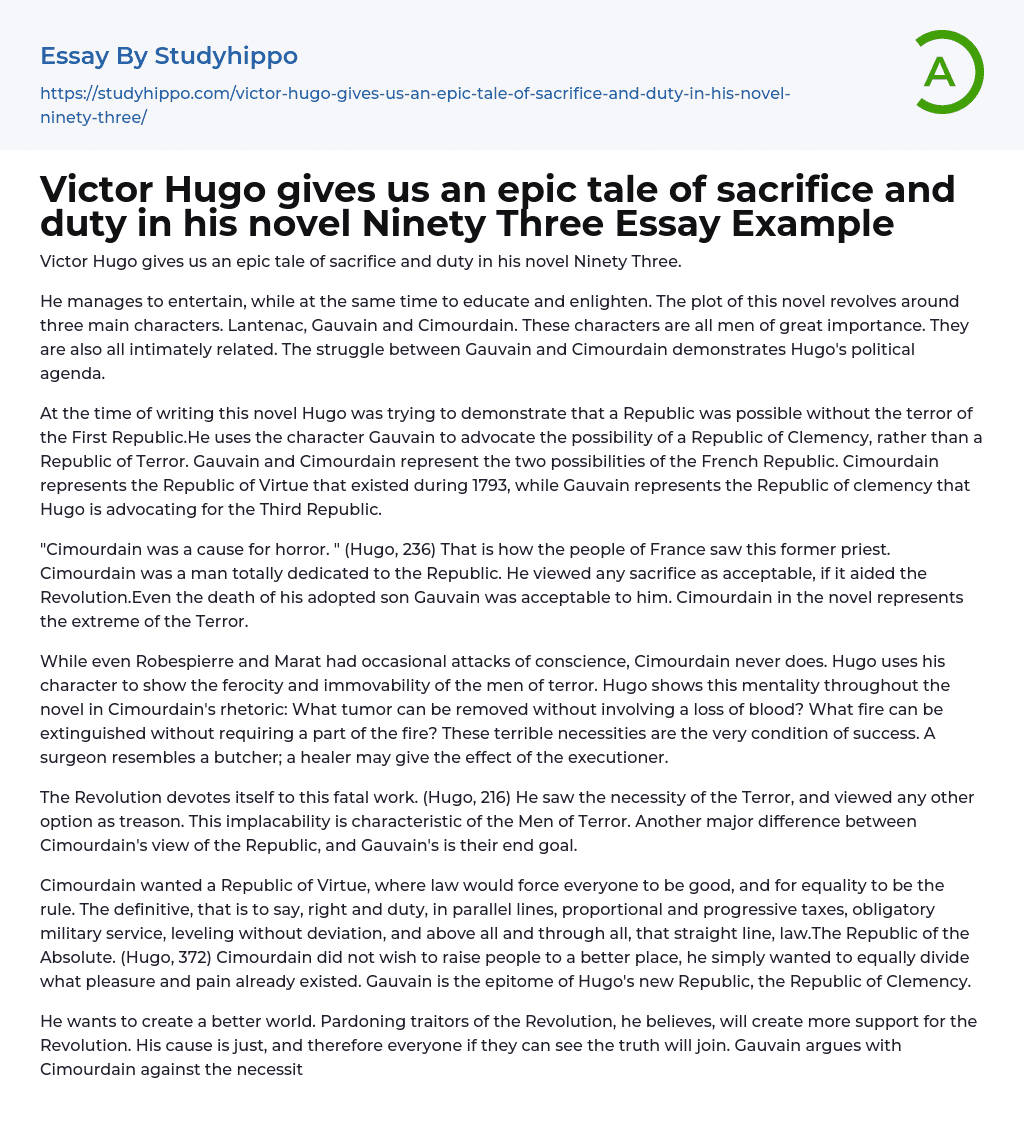

Victor Hugo gives us an epic tale of sacrifice and duty in his novel Ninety Three Essay Example
< p > In his book Ninety Three, Victor Hugo presents a grand narrative of devotion and obligation. < /p >
Hugo skillfully combines entertainment, education, and enlightenment in his novel, which centers on the three main characters of Lantenac, Gauvain, and Cimourdain. These significant male figures are interconnected, and their conflict embodies Hugo's political stance.
In writing this novel, Hugo aimed to showcase the possibility of a Republic that did not succumb to the brutalities of the First Republic. Through the character of Gauvain, he advocates for a Republic of Clemency instead of one of Terror. In the novel, Gauvain and Cimourdain embody the two options for the French Republic. While Cimourdain represents the Republic of Virtue that was present in 1793, Gauvain embodies the Republic of Clemency that Hugo proposes for the Third Republic.
Accordi
...ng to Hugo (236), Cimourdain inspired horror in the people of France due to his total dedication to the Republic. Despite being a former priest, he believed that any sacrifice was justified in furthering the Revolution, even the death of his adopted son Gauvain. In the novel, Cimourdain represents the extreme of the Terror.
Victor Hugo portrays Cimourdain as a character with an unwavering and savage mentality, in contrast to even Robespierre and Marat who had occasional bouts of guilt. Throughout the novel, Cimourdain's rhetoric reveals this ferocity, as he argues that success cannot be attained without facing the terrible necessities of losing blood or sacrificing a portion of oneself. Cimourdain compares a surgeon to a butcher, and a healer to an executioner, emphasizing the brutal nature of achieving success in this era of terror.
According to Hugo (216), Th
Revolution is fully dedicated to this deadly task, and any alternative is considered treacherous. The Men of Terror are known for their unyielding nature. Cimourdain and Gauvain have differing final objectives for the Republic.
Cimourdain's goal was to establish a Republic of Virtue that would ensure everyone's goodness and equality through the implementation of law. He believed that proportional and progressive taxes, obligatory military service, and strict leveling without deviation were essential measures in creating a fair and just society governed by the absolute straight line of law. Cimourdain's ideal Republic aimed to equally distribute pleasure and pain without elevating anyone to a higher position. Hugo saw Gauvain as the embodiment of his vision for a new Republic, one characterized by clemency.
In his desire to create a better world, Gauvain proposes pardoning Revolution traitors to gain more support. He argues with Cimourdain about the necessity of the Terror, believing that Liberty, Equality, and Fraternity should be upheld in harmony without creating fear. Ultimately, Gauvain believes that his cause is just and that everyone will support it once they understand the truth.
"It is possible to achieve good without resorting to evil," wrote Hugo (217). Gauvain, a proponent of the revolution's original ideas, seeks to transform the old world into a peaceful society where men can improve themselves.
Gauvain conveyed to Cimourdain the distinction between their ideals. According to him, Cimourdain's Republic governs and regulates humans while his own elevates them to soaring heights like an eagle instead of a theorem (Hugo, 372). He also opposed mandatory military service as it would require citizens to fight against other humans, which did not align with his beliefs for the Republic.
The
sentiment expressed in Hugo's quote (373) reflects both his and Gauvain's idealism. While you aim to assist the wretched and implement proportional taxes, I strive for the suppression of misery and a complete elimination of taxes.
Hugo proposes a Republic akin to that of 1789, but with nobler aspirations and moderated by leniency. The French Revolution's extremes are embodied by Gauvain and Cimourdain: the former urges humanity and pity, while the latter advocates terror as a means to purify the Republic. Hugo uses these two characters to illustrate the two Republics.
The idea of a Republic that embodies Clemency instead of Terror is presented by Hugo as a goal that can elevate humanity to new heights. In describing his vision for such a Republic, Gauvain makes one yearn for its existence. Hugo's novels were so powerful that they served as inspiration for a revolution, resulting in a Republic that truly embodies Liberty, Equality, and Fraternity.
- Nineteen Eighty-Four essays
- Maus essays
- Career Choice essays
- Career Goals essays
- Career Plan essays
- Community Service essays
- Dream Job essays
- Duty essays
- Employee essays
- Internship essays
- Interview essays
- Job essays
- Job Interview essays
- Performance Appraisal essays
- Portfolio essays
- Service essays
- Skills essays
- Vocation essays
- Work Experience essays
- Work-Life Balance essays
- Allegory essays
- Alliteration essays
- Comedy essays
- Comic book essays
- Drama essays
- Dystopia essays
- Fairy Tale essays
- Fantasy essays
- Fiction essays
- Ghost essays
- Gothic Fiction essays
- Gothic Literature essays
- Irony essays
- Legend essays
- Memoir essays
- Novel essays
- Poetry essays
- Satire essays
- Science Fiction essays
- Short Story essays
- The western essays
- Tragedy essays
- Witchcraft essays
- Cuban Missile Crisis essays
- Fidel Castro essays
- French Revolution essays
- Han Dynasty essays
- Hiroshima essays
- Imperialism essays
- Jack The Ripper essays



